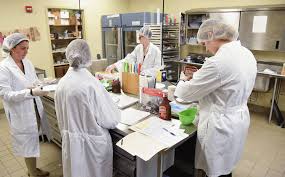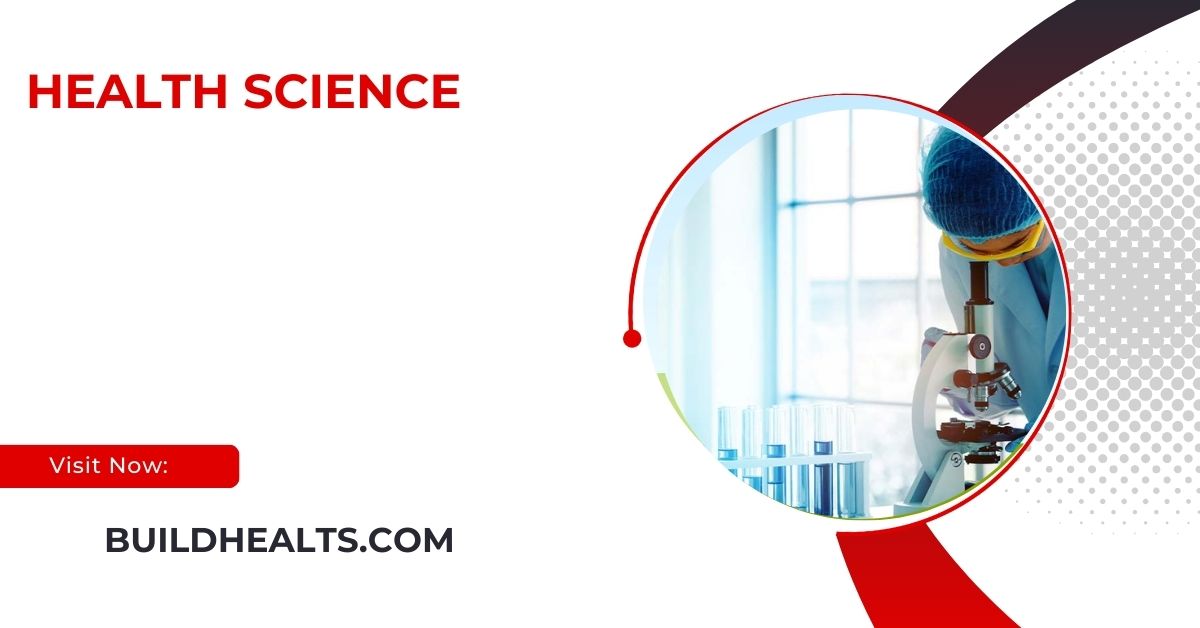Health science applies scientific knowledge to improve human health, studying the body, diseases, medical technologies, and treatments across diverse fields like medicine.
This article explores what health science is, its branches, and its significance in modern society.
What is Health Science?

Health science is the use of scientific knowledge to improve human health. It involves studying the human body, diseases, medical technologies, and developing treatments to restore or enhance health. Professionals apply expertise in biology, chemistry, physics, and other fields to prevent illnesses, promote well-being, and improve health outcomes. Health science is diverse, collaborating with public health, biotechnology, and environmental science, leading to advancements like vaccines, surgical techniques, and innovative treatments that save lives.
Importance of Health Science:
Health science is vital for improving both individual and community well-being. Its discoveries lead to better healthcare systems, improved treatments, and increased life expectancy. Major achievements like antibiotics, vaccines, and advanced surgical methods stem from health science research. Additionally, it supports disease prevention through education on nutrition, exercise, and mental health. The field also addresses global health challenges, including infectious diseases, environmental concerns, and mental health issues, contributing to overall public health improvement.
Branches of Health Science:
Health science covers various specialized areas of study. These fields are designed to address different aspects of human health. Some of the key branches of health science include:
Medicine:
Medicine is a key branch of health science focused on diagnosing, treating, and preventing diseases. It includes medical professionals like doctors, nurses, and surgeons who play a vital role in maintaining public health. Medicine also encompasses specialties such as cardiology, neurology, and pediatrics, each focusing on specific aspects of health. Health science supports the development of effective treatments, surgical procedures, and patient care strategies to improve overall health outcomes and enhance life expectancy.
Also read: American Health Network – An Overview Of Its Services And Benefits!
Nursing:
Nursing is an essential branch of health science that focuses on patient care and support. Nurses collaborate with doctors to manage patients’ health, assist in medical procedures, and offer comfort and education. Nursing science covers patient care techniques, medication administration, and health promotion. Nurses play a crucial role in improving patient well-being by monitoring health conditions, providing emotional support, and educating patients and families on managing health conditions and promoting preventive care.
Public Health:
Public health focuses on improving the health of populations rather than individuals. It involves research, disease prevention, and promoting healthy lifestyles. Public health experts develop initiatives like vaccination programs, sanitation efforts, and health education campaigns. They also work to control infectious disease outbreaks and address environmental health risks. By improving access to healthcare and addressing health disparities, public health professionals aim to enhance overall community well-being and prevent the spread of preventable diseases.
Pharmacy:
Pharmacy is a critical branch of health science focused on medication preparation and dispensing. Pharmacists ensure patients receive the correct medications and understand their usage and potential side effects. Pharmacy science also involves researching new drugs and therapies, as well as improving existing treatments. Pharmacists play a key role in advising healthcare providers and patients on medication management, helping to ensure that prescriptions are used effectively to treat and manage various health conditions.
Nutrition Science:

Nutrition science studies the impact of food on human health. It explores the relationship between diet and diseases like obesity, diabetes, and heart disease. Nutritionists and dietitians guide individuals toward healthy eating habits to improve physical and mental well-being. This field examines how nutrients affect body functions and helps in the prevention and management of chronic diseases. Nutrition science plays a key role in public health by promoting balanced diets and lifestyle choices to maintain optimal health.
Biomedical Science:
Biomedical science is the study of biological mechanisms behind diseases. It integrates biology and medicine to understand disease causes, develop cures, and create new treatments. Biomedical scientists conduct laboratory research in fields like genetics, microbiology, and cell biology to uncover the biological processes that lead to illness. Their work is vital in developing new medical technologies, therapies, and diagnostic tools that improve the understanding and treatment of diseases, contributing to better healthcare outcomes.
Mental Health Science:
Mental health science is focused on understanding and treating mental illnesses like depression, anxiety, and schizophrenia. It combines fields like psychology, psychiatry, and neuroscience to develop effective treatments, therapies, and medications for mental health disorders. Mental health professionals work with individuals to help them manage emotional challenges, improve psychological well-being, and develop coping strategies. This branch plays a crucial role in reducing the stigma surrounding mental illness and promoting mental health awareness and support.
Environmental Health:
Environmental health studies the relationship between the environment and human health. It examines factors like pollution, water quality, and climate change and how they impact physical and mental well-being. Environmental health professionals work to reduce health risks from environmental hazards and promote healthier living conditions. By addressing issues like air quality, toxic exposure, and waste management, environmental health experts strive to improve public health and create safer, more sustainable environments for communities.
Also read: Ssm Health Mychart – A Simple Guide To Managing Your Health Online!
The Role of Technology in Health Science:
Technology has revolutionized the field of health science. Innovations in medical equipment, diagnostic tools, and treatment methods have improved patient care and outcomes. Some of the ways technology is used in health science include:
- Telemedicine: Telemedicine allows doctors and patients to communicate remotely, providing healthcare services to individuals in remote or underserved areas.
- Robotics: Robotic surgery and other medical technologies help to improve precision during operations, leading to better recovery times and fewer complications.
- Artificial Intelligence (AI): AI is used to analyze medical data, predict health trends, and assist in diagnosing diseases, speeding up the process of treatment and care.
- Genomics: Advances in genomics have allowed researchers to understand how genetics influence diseases, paving the way for personalized medicine and targeted treatments.
Career Opportunities in Health Science:
Health science offers numerous career opportunities for individuals passionate about making a difference in people’s lives. Some of the popular career paths in health science include:
- Doctor or Surgeon: Medical professionals are in high demand worldwide, providing diagnosis, treatment, and surgical care.
- Nurse: Nurses play a central role in healthcare, offering patient care, education, and support to families.
- Pharmacist: Pharmacists dispense medications, counsel patients, and work with doctors to ensure safe and effective medication use.
- Public Health Specialist: These professionals work to improve population health through research, policy development, and health education.
- Nutritionist/Dietitian: These experts help people make healthier food choices and manage diseases through nutrition.
- Biomedical Researcher: Biomedical scientists contribute to disease research and the development of new treatments.
- Mental Health Counselor: These professionals help individuals manage emotional and mental health challenges, providing therapy and support.
Skills Required for a Career in Health Science:

Working in health science requires a combination of technical knowledge and interpersonal skills. Some of the essential skills for a career in health science include:
- Communication Skills: Being able to communicate clearly with patients, families, and other healthcare professionals is vital.
- Critical Thinking: Health science professionals need to assess situations, diagnose problems, and come up with effective solutions.
- Empathy and Compassion: The ability to understand and share the feelings of others is crucial in providing quality patient care.
- Attention to Detail: In health science, even the smallest mistake can have serious consequences, making attention to detail essential.
- Technical Knowledge: A deep understanding of medical concepts, biological systems, and technologies is essential for most health science careers.
Challenges in Health Science:
While health science has made significant progress, there are still several challenges to address:
- Access to Healthcare: Many people around the world lack access to quality healthcare, particularly in rural or low-income areas.
- Emerging Diseases: New diseases and health threats, such as pandemics, require quick responses and ongoing research.
- Mental Health Stigma: Mental health issues are often misunderstood, and stigma can prevent people from seeking treatment.
- Environmental Factors: Pollution, climate change, and other environmental factors continue to impact global health.
- Rising Healthcare Costs: The cost of medical treatments and medications continues to rise, making it difficult for some people to afford necessary care.
FAQ’s
1. What is health science?
Health science is the study and application of scientific knowledge to improve human health, focusing on understanding diseases, developing treatments, and promoting overall well-being.
2. What are the branches of health science?
Health science includes medicine, nursing, public health, pharmacy, nutrition science, biomedical science, mental health science, and environmental health, each addressing different aspects of human health.
3. How does technology impact health science?
Technology enhances health science through telemedicine, robotics, AI, and genomics, improving diagnosis, treatments, and patient care for better health outcomes and efficiency.
4. What careers are available in health science?
Careers in health science include doctors, nurses, pharmacists, public health specialists, biomedical researchers, mental health counselors, and dietitians, each contributing to patient care and health improvement.
5. What challenges does health science face today?
Health science faces challenges such as healthcare access, emerging diseases, mental health stigma, environmental risks, and rising healthcare costs, which impact global public health efforts.
Conclusion
In conclusion, health science plays a crucial role in improving human health through research and application of medical knowledge across various fields. Its advancements have led to significant improvements in treatments, disease prevention, and public health. Despite challenges such as access to healthcare and rising costs, health science continues to evolve, offering better health outcomes and career opportunities worldwide.




